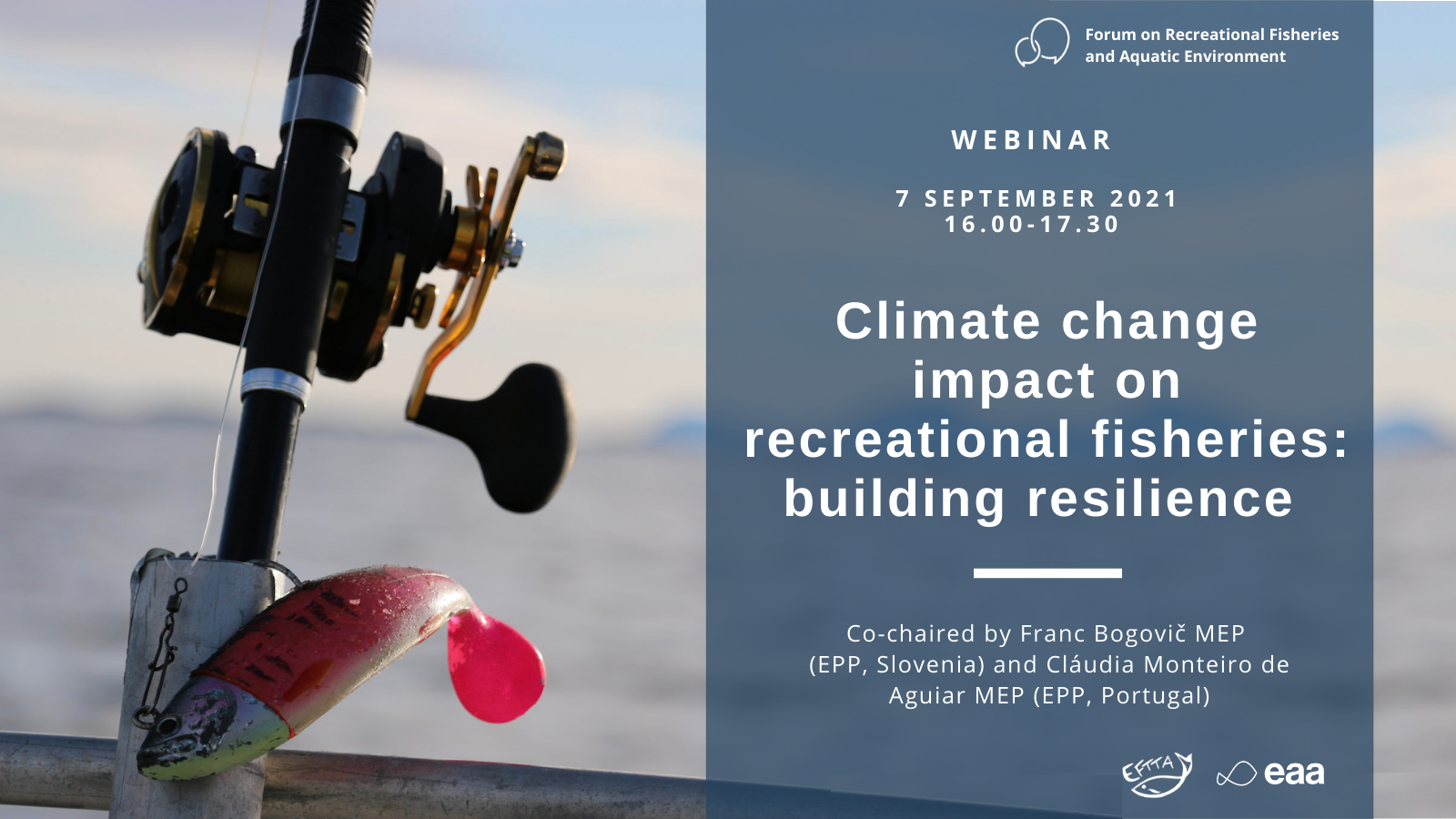Recreational anglers urge the EU to step up support for climate change adaptation and mitigation measures
Climate change has both direct and indirect impacts on the aquatic environment and the European recreational fisheries sector: shifts in fish stocks distributions, extreme weather events, changes in river stream, increasing water temperature, etc. The sector is particularly active in projects to help mitigate those impacts but adequate EU policy, funding and research are crucial to help the sector to adapt.
The report of the event is available here.
Ahead of the UN Climate Change Conference (COP26) taking place in November 2021 in Glasgow, MEP Niclas Herbst (Germany, EPP Group), Chair of the Forum, and MEP Franc Bogovič (Slovenia, EPP Group) co-chaired on 7 September the European Parliament Forum on Recreational Fisheries and Aquatic Environment webinar addressing the impacts of climate change on the recreational fisheries sector.
MEP Franc Bogovič recalled that climate change has been identified as one of the main drivers of biodiversity loss. He explained that the problem is not only the increase of average temperatures but also the extreme highs and lows of temperatures in different seasons, even during a very short period of time, that can have dramatic effects on the environment. Furthermore, he highlighted “the need to find win-win solutions that involve protecting, restoring and sustainably managing ecosystems to build resilience”.
MEP Niclas Herbst stressed the importance to look at the impact of climate change on recreational fisheries. “It is essential to understand how it affects our marine and freshwater ecosystems and how to best prepare the sectors that depend on it, such as the recreational fisheries”, he said.
Three panellists took the floor to discuss the various impacts of climate change on the aquatic environment and on the recreational fisheries sector. Regarding the freshwater environment, Marijan Govedič, Director of the Centre for Cartography of Fauna and Flora (Slovenia), insisted on the need to consider both the visible (water regimes and temperature) and invisible changes on rivers (in the interstitial and riparian zones) which affect the natural resilience of ecosystems. Adding to that, Igor Miličić, Secretary General of the Fishing Association of Slovenia, described the negative impact of climate change on fly fishing tourism in Slovenia and the uncertainty it creates, as well as mitigation activities in which anglers can be involved such as restoring riparian growth.
Regarding the marine environment, David Mitchell, Chair of the European Anglers Alliance’ Sea Subgroup, drew attention to some challenges and opportunities, focusing on the North Sea and shifting fish stocks distribution. He argued that further research into the impacts of climate change on fisheries and dependent communities should be funded by the EU and that the recreational fisheries sector needs recognition from the EU given its economic importance and potential jobs at stake when it comes to climate adaptation.
In addition, Olivier Portrat, CEO of the European Fishing Tackle Trade Association (EFTTA), called on the EU and Member States to support anglers’ and angling clubs’ habitat restoration projects as well as projects linking restoration or restocking activities and angling tourism. Nevertheless, those efforts may be pointless if there is no understanding of such phenomenon, including at the EU level, notes Olivier Portrat. “By better understanding climate change impact, we will take better policy decisions”, he argued.
In conclusion, MEP Niclas Herbst finished the event by an important statement: "We know that anglers are a big part of the solution. Who else could do it if not the recreational fisheries sector?"
Documents of the meeting:
Presentations:
Webinar
Climate change impact on recreational fisheries: building resilience
7 September 2021
MEP Franc Bogovič and MEP Cláudia Monteiro de Aguiar will co-chair the webinar “Climate change impact on recreational fisheries: building resilience” organised by the European Parliament Forum on Recreational Fisheries and Aquatic Environment, with the support of the European Anglers Alliance (EAA) and the European Fishing Tackle Trade Association (EFTTA).
Please register here.

The webinar will take place on 7 September 2021, from 16:00 to 17:30.
Climate change is affecting the marine, coastal and freshwater environment through rising temperatures, rising sea levels, extreme weather events, changes in river streams, deoxygenation, acidification, disruption to natural processes, etc. The ability of ecosystems to cope with these changes is decreasing.
Some communities rely heavily on healthy fish stocks, including in some specific or unique to particular locations. Shifts in the distribution of stocks are problematic to commercial and recreational fishing alike, sometimes threatening the livelihood of communities relying on these fishing activities, both by the sea and along rivers. Those communities need to be supported in their efforts to mitigate the negative effects of climate change to embrace new opportunities, as they prepare to adapt to new realities. For example, tuna fishing can now take place in Norway, Sweden and Denmark with a huge potential for angling tourism. The economic resilience of those communities thus lies on their ability to take adequate measures to adapt to climate change and may require more flexibility or anticipation in the management of fish stocks.
Ahead of the UNFCCC COP26 in Glasgow in November and based on two case studies on the North Sea and the Alpine waters, the meeting will be an opportunity to examine the impacts of climate change on the aquatic environment, on the recreational fisheries sector and on the coastal, rural and remote communities depending on this sector and healthy aquatic environment. Panellists will also discuss the need and the opportunities to build resilience in those affected communities.